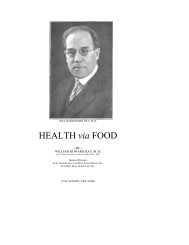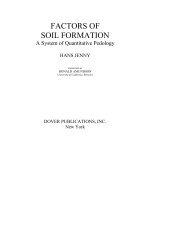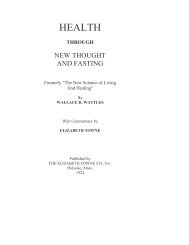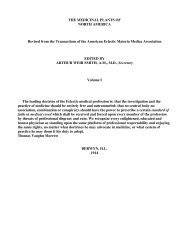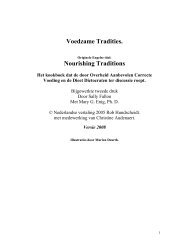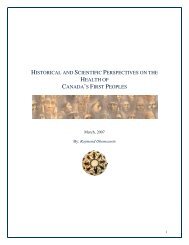- Page 1 and 2: THE SOCIOECONOMIC AND CULTURAL SIGN
- Page 3 and 4: To Anastasia and to millions of Rus
- Page 5 and 6: ACKNOWLEDGEMENTS When I started res
- Page 7 and 8: TABLE OF CONTENTS ACKNOWLEDGEMENTS
- Page 9 and 10: CHAPTER 2. HOUSEHOLD GARDENING IN T
- Page 11 and 12: Agri-cultural values . . . . . . .
- Page 13 and 14: 14. Views of Marxists and Chaianov
- Page 15 and 16: 52. Distribution of responses to cu
- Page 17 and 18: 13. Peasant-like households in the
- Page 19 and 20: THE SOCIOECONOMIC AND CULTURAL SIGN
- Page 21 and 22: Dacha. The term dacha, dating back
- Page 23 and 24: farming in reference to gardening,
- Page 25 and 26: In this dissertation, I use the Lib
- Page 27: Recently, it has been increasingly
- Page 31 and 32: largely due to the proliferation of
- Page 33 and 34: 80% 70% 60% 50% 40% 30% 67% 33% 48%
- Page 35 and 36: Table 2. Land usage by different gr
- Page 37 and 38: garden-plots is certainly intention
- Page 39 and 40: Finally, the gardening practices ar
- Page 41 and 42: That household gardening is a highl
- Page 43 and 44: Table 6: Distribution of land under
- Page 45 and 46: Table 7. Distribution of land under
- Page 47 and 48: Table 8. Number of households ownin
- Page 49 and 50: Table 10. Employers’ requests for
- Page 51 and 52: Table 11 shows that of the 80,342 g
- Page 53 and 54: household subsistence comes first,
- Page 55 and 56: Household production plays an impor
- Page 57 and 58: the country’s agricultural output
- Page 59 and 60: • Subsidy-free: This mode of agri
- Page 61 and 62: was not only “beautiful,” but i
- Page 63 and 64: for several decades, Kurdiumov (200
- Page 65 and 66: Organic husbandry minimizes agroche
- Page 67 and 68: have recently been vindicated by sc
- Page 69 and 70: oth Russia and the U.S. Indeed, as
- Page 71 and 72: another important factor shaping th
- Page 73 and 74: Community development In the U.S.,
- Page 75 and 76: THE CULTURAL DIMENSION Culture and
- Page 77 and 78: First, a study of agriculture witho
- Page 79 and 80:
All of these questions suggest that
- Page 81 and 82:
Figure 10. Old Russian distaffs dec
- Page 83 and 84:
A related danger arises when differ
- Page 85 and 86:
to the same extent as the human bod
- Page 87 and 88:
the sacredness of the human-earth c
- Page 89 and 90:
My interest here is not so much in
- Page 91 and 92:
introduction of a new ideology that
- Page 93 and 94:
from cereal crops and beans, vegeta
- Page 95 and 96:
lit. “the bearing of fruit”), r
- Page 97 and 98:
As the society was composed of fami
- Page 99 and 100:
As we see, subsistence growing stoo
- Page 101 and 102:
While the princes themselves could
- Page 103 and 104:
Since pagan lifestyle and beliefs p
- Page 105 and 106:
and “sinful” for Christians —
- Page 107 and 108:
adopted from the pagan religion and
- Page 109 and 110:
Figure 15. A peasant being whipped,
- Page 111 and 112:
However, the emancipation of serfs
- Page 113 and 114:
• nationalization of land ownersh
- Page 115 and 116:
Figure 17. “October 25 [date of t
- Page 117 and 118:
But, in addition to agriculture bei
- Page 119 and 120:
Peasant economy is the most perfect
- Page 121 and 122:
the way of the builders of a new so
- Page 123 and 124:
Figure 18. “Raise vegetables!”
- Page 125 and 126:
in areas around major cities and in
- Page 127 and 128:
But times have changed: the new lea
- Page 129 and 130:
uilding project explained that he h
- Page 131 and 132:
CHAPTER 2 HOUSEHOLD GARDENING IN TH
- Page 133 and 134:
• What cultural values do gardene
- Page 135 and 136:
cultivate? How did the volume of pr
- Page 137 and 138:
Value and limitations of the region
- Page 139 and 140:
METHODOLOGY Research Design This is
- Page 141 and 142:
190 km east of Moscow. Fifteen thou
- Page 143 and 144:
Economy. In 2005, the Gross Regiona
- Page 145 and 146:
Another group that is excluded from
- Page 147 and 148:
period lies outside both the tradit
- Page 149 and 150:
• Stage 4 — systematic sampling
- Page 151 and 152:
[Table 16 continued.] (1) (2) (3) (
- Page 153 and 154:
average size of households evolve s
- Page 155 and 156:
Instrumentation Description of inst
- Page 157 and 158:
values (including the notion that r
- Page 159 and 160:
in everyday life. Also, Stern et al
- Page 161 and 162:
Notes to Table 17: 1) Items 2 and 1
- Page 163 and 164:
have experience in conducting rural
- Page 165 and 166:
All interviewers without exception
- Page 167 and 168:
Once a schedule was completed (incl
- Page 169 and 170:
News from the field Accustomed to c
- Page 171 and 172:
Data entry After each schedule pass
- Page 173 and 174:
GENERAL SURVEY RESULTS Demographics
- Page 175 and 176:
is a household, not an individual).
- Page 177 and 178:
The reasons for not participating i
- Page 179 and 180:
A number of studies (notably Clarke
- Page 181 and 182:
Percent of households 45% 40% 35% 3
- Page 183 and 184:
Average garden size, ha 0.18 0.16 0
- Page 185 and 186:
Gardeners use a variety of legal fo
- Page 187 and 188:
Percent of households 35% 30% 25% 2
- Page 189 and 190:
It should be noted that the amount
- Page 191 and 192:
Note that even the machinery used o
- Page 193 and 194:
e regarded as rough approximations
- Page 195 and 196:
less important than many other expe
- Page 197 and 198:
Sharing with relatives or friends c
- Page 199 and 200:
ee products offer the largest avera
- Page 201 and 202:
The income sellers derived from the
- Page 203 and 204:
Number of households, percent 50% 4
- Page 205 and 206:
Table 41. Number of gardening house
- Page 207 and 208:
in Chapter 1 on the basis of nation
- Page 209 and 210:
The next common practice is crop ro
- Page 211 and 212:
Seed sources Gardeners play an impo
- Page 213 and 214:
Table 48. Uses of garden-plots by h
- Page 215 and 216:
Table 49. Households’ rankings of
- Page 217 and 218:
Agri-cultural values As we have see
- Page 219 and 220:
• age of respondent, • gender o
- Page 221 and 222:
Finally, there is a small differenc
- Page 223 and 224:
[Table 52 continued.] [14] Agricult
- Page 225 and 226:
The five items with the lowest scor
- Page 227 and 228:
very imperfect measures of the actu
- Page 229 and 230:
Information and skills From 2001 on
- Page 231 and 232:
Interaction with others and persona
- Page 233 and 234:
major problem for many urbanites du
- Page 235 and 236:
CHAPTER 3 THE INVISIBLE GARDENS The
- Page 237 and 238:
“STRETCH YOUR BRAINS” An early
- Page 239 and 240:
However, we have a millennial recor
- Page 241 and 242:
However, the idea that micro-scale
- Page 243 and 244:
This observation has important impl
- Page 245 and 246:
of Chaianov the vast majority of Ru
- Page 247 and 248:
(including fruits and berries), whi
- Page 249 and 250:
claims over what was once people’
- Page 251 and 252:
In addition, there is a growing con
- Page 253 and 254:
that could result in a wholesale tr
- Page 255 and 256:
e known by the name of Anastasia (w
- Page 257 and 258:
In the vision of Megré and the new
- Page 259 and 260:
Figure 41. A maintenance-free apple
- Page 261 and 262:
Thus, Vasilii Dokuchaev, after deca
- Page 263 and 264:
Figure 42. “Dig for victory now!
- Page 265 and 266:
Figure 43. A community garden near
- Page 267 and 268:
industry, master gardener programs,
- Page 269 and 270:
Chaianov, A.V. 1991. Osnovnye idei
- Page 271 and 272:
Jones, E. 2002. Social responsibili
- Page 273 and 274:
O’Brien, D.J., Wegren, S.K., and
- Page 275 and 276:
Sharashkin, L., Gold, M., and Barha
- Page 277 and 278:
Yaroshenko, S. 1998. Domashnie khoz
- Page 279 and 280:
6. HOW MANY GARDEN-PLOTS DO YOU OWN
- Page 281 and 282:
4. landscaping 5. travel to the plo
- Page 283 and 284:
3 - stay about the same 4 - decreas
- Page 285 and 286:
12 poultry 97 other___________ 36.
- Page 287 and 288:
Maintaining our connection to the e
- Page 289 and 290:
4 5 6 7 8 9 10 11 12 13 14 15 16 17
- Page 291 and 292:
61. WHERE HAVE YOU SPENT MOST OF YO
- Page 293:
VITA Leonid Sharashkin was born on



